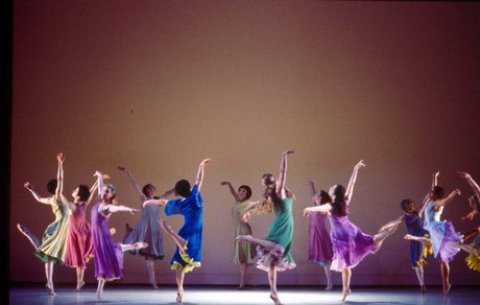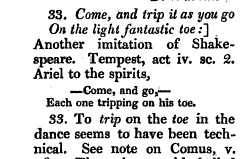This is a really cool phrase. It certainly evokes imagery of dancing about nimbly on a ray of light, or something of the sort. But how does it make sense? "to trip" I can see as being kind of like dancing. "to trip the light" - which light? And what part of speech is "fantastic" here?
-
5I don't feel like quoting an entire Wikipedia article, so I'll just link to it.– RegDwigнtCommented Dec 1, 2010 at 15:43
-
Part of your problem with understanding this phrase is that you are reading 'light' as a noun when it's actually a adjective (light as the opposite of heavy, not light as illumination). In similar contexts it can also be used to form the adverb lightly ("go lightly on the ledge babe": Bob Dylan). Once you get that and the fact that 'tripping' has been used for centuries ("come tripping down the stair" from the traditional song The Bonny Lass of Fyvie) to mean stepping nimbly and light-footedly the phrase makes sense.– BoldBenCommented Sep 29, 2016 at 6:35
-
@BoldBen the problem with reading "light" as an adjective is that it leaves "trip" with no object unless you add the missing word, "toe."– phoogCommented May 2, 2017 at 3:28
-
@phoog You can make the same argument about 'fantastic'. I've always felt that either 'light fantastic' is a pair of adjectives used as a truncated version of a noun phrase ('light fantastic toe' or similar) or that 'fantastic' is an adjective used as a noun. If you take the second option then 'light' is an adjective modifying 'fantastic'. We do that sort of thing in English, think of taxi which is short for 'taximeter cab' or bus which is short for 'omnibus carriage'.– BoldBenCommented May 3, 2017 at 21:19
3 Answers
I lighted upon the following excerpt, and thought it explained the meaning of this charming and idiosyncratic phrase quite well. From Etiquette, politeness, and good breeding: embracing all forms and ceremonies in the etiquette of marriage, etc. Printed in London, 1870.
But one, on whom a brighter light than he possessed dawned in far-off years, enjoined the utmost refinement both in dress and manner to the daughters of his people. Remember this when “tripping on the light fantastic toe,” and preserve the strictest modesty in all your movements. Remember also that it is your safeguard, throwing a halo of light and purity around you; and therefore do not affect to be an accomplished dancer, to display the science and agility of an artiste. It is sufficient that you dance with ease and grace—that you enter into the amusement as becomes a gentlewoman, neither with careless indifference, nor yet with affectation or excessive hilarity. Carefully avoid all such dances as are offensive to refinement and good taste: [...]
In other words, tripping refers to movement; to being nimble-footed. Oxford Dictionaries defines trip as: Walk, run, or dance with quick light steps. The idea of running quickly also appears in Shakespeare's The Tempest (1610–11):
Ariel:
Before you can say ‘come’, and ‘go’,
And breathe twice; and cry, ‘so, so’;
Each one tripping on his toe,
Will be here with mop, and mowe.1
Do you love me, master, no?
Several sources online suggest that John Milton drew inspiration from this Shakespearian line when he wrote his poem L’Allegro, published in 1645 and included the following verse
Come, and trip it, as you go,
On the light fantastic toe;
The light fantastic modifies toe, which symbolises feet, and means to dance in an agile, effortless and fantastic manner. A similar expression, which should help to understand further, is to be light on one's feet.
-
2It is a shame that this answer does not mention Milton, who appears to have coined the phrase.– phoogCommented May 2, 2017 at 3:27
-
@phoog it was mentioned in Von C's answer, I prefer not to duplicate other answers if possible. Besides, the OP didn't ask for its origin, but for its meaning. Shakespeare's reference is older, if that helps. Commented May 2, 2017 at 3:29
-
1But Shakespeare's use of "trip" includes neither "light" nor "fantastic."– phoogCommented May 2, 2017 at 3:35
-
2@phoog Yes. I know. But where did Milton get his idea from?? 😊 But now the seven-year-old question has two good answers which complement one another. Commented May 2, 2017 at 3:39
-
1@phoog I'm more surprised that no one seems to have mentioned the (presumably) more recent spin-off skip the light fandango. Commented May 7, 2017 at 22:51
The common reference (as mentioned for instance in wordreference is from a verse in Milton’s L’Allegro (a pastoral poem by John Milton published in 1645).
The Wikipedia article list all the other references/origins.
"Come, and trip it as you go, on the light fantastic toe."
This article illustrates the result when it is presented as modern ballet:
L’Allegro, il Penseroso ed il Moderatois uncategorisable - it’s both dance and oratorio, both narratively coloured and yet at times more formally complex than purest ballet.Milton's phrase, 'Trip it as you go/ On the light fantastic toe', could have been minted for Mark Morris.

Gramophone and culturevulture concur:
There is a verse in Milton’s L’Allegro that may have inspired Morris to craft this highly innovative dance: "Come, and trip it as you go, on the light fantastic toe."
His dancers can trip the light fantastic with the best of them [...].
-
-
@Mari-LouA Thank you. I have replaced the first link, and restored the second one.– VonCCommented May 2, 2017 at 4:34
-
If you look at the Wikipedia page about the Allegro poem, (2nd link) amazingly the lines containing "Come, and trip it as you go, on the light fantastic toe." are missing! Or not mentioned. It seems crazy, but it's true. Commented May 3, 2017 at 7:40
-
@Mari-LouA but the poem is mentioned on the Wikipedia page for the phrase: en.wikipedia.org/wiki/Trip_the_light_fantastic_(phrase)– phoogCommented May 8, 2017 at 0:34
The word [trip] had long been used to mean 'dance nimbly'. Chaucer used it that way as early as 1386, in The Miller's Tale:
In twenty manere koude he trippe and daunce. (In twenty ways could he trip and dance.)
– "The meaning and origin of the expression: Trip the light fantastic", The Phrase Finder, Copyright © Gary Martin

